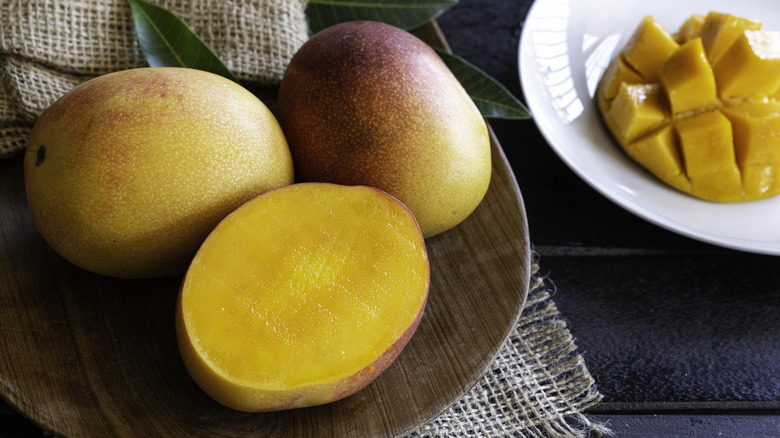Say Goodbye To Poop Troubles With A Little Help From This Popular Fruit
If your bowels are giving you nothing but trouble, it could very well be a sign of constipation. If you're regularly straining when trying to poop, it feels as if you're not fully empty after going number two, or the frequency of your bowel movements are few and far between, constipation may be to blame.
Inadequate hydration, a lack of fiber in one's diet, or fighting against the oncoming urge to poop are all factors that can lead to constipation, explains the Mayo Clinic. While some cases of constipation may instead be due to the use of certain medications, health issues, or intestinal blockages, cases of slow-moving stool through the colon that are related to lifestyle factors can potentially be relieved through diet modifications. Fiber-rich foods like lentils or whole grains might be among the first choices that come to mind, but if fruit is your first love, reaching for a ripe mango may offer similar improvements in gut motility, according to a 2018 research article published in Molecular Nutrition & Food Research.
Mangoes may help relieve symptoms of constipation and IBD
In one raw mango fruit (210 grams), the U.S. Department of Agriculture (USDA) reports that you'll find 3.36 grams of fiber. In the previously mentioned 2018 research article, experts conducted a four-week pilot study in which participants with chronic constipation were to eat either 300 grams of mango, specifically, or an equivalent amount of fiber. It was found that those in the mango-eating group experienced greater improvements in bowel movement frequency, as well as stool consistency and shape over those who received the fiber equivalents.
Mangoes may also help alleviate another kind of poop trouble thanks to their polyphenol content: symptoms related to irritable bowel disease (IBD). People with IBD experience chronic inflammation within the intestines and an imbalance of gut bacteria, reports the U.S. Centers for Disease Control and Prevention (CDC). This can lead to symptoms of abdominal pain, bloody stool, and ongoing diarrhea when dealing with an IBD flare-up. According to a small 2020 pilot study published in Nutrition Research, participants diagnosed with IBD who consumed 200 to 400 grams of mango pulp over the course of eight weeks showed a reduction in inflammatory protein levels and improvements in their gut microbiome.
Possible health risks associated with eating mangoes
While mangoes may be one deliciously sweet solution to your bathroom woes, they should not be considered the sole method of treatment. Rather, researchers from the 2020 pilot study point out that including mangoes in one's diet may be an effective supplementary treatment in addition to adhering to any IBD prescription medication treatments.
Alternatively, people with diabetes may be advised to avoid mangoes due to the fact that they're rich in natural sugar (per Medical News Today). What's more, dried mango products can kick the fruit's sugar content up a notch with additives.
Finally, the American Heart Association (AHA) states that mango skin harbors the oil urushiol, the same substance found in poison ivy that prompts an allergic skin reaction. People who are highly sensitive to the oil may be advised by their doctor to avoid eating mangoes or to wear protective gloves when handling the fruit. This may be particularly encouraged for those who have had an allergic reaction to poison ivy in the past. Such was the case for a healthy man who had previously been exposed to poison ivy and later experienced a delayed allergic reaction to mango, as outlined in a 2019 case report published in Clinical Practice and Cases in Emergency Medicine.



